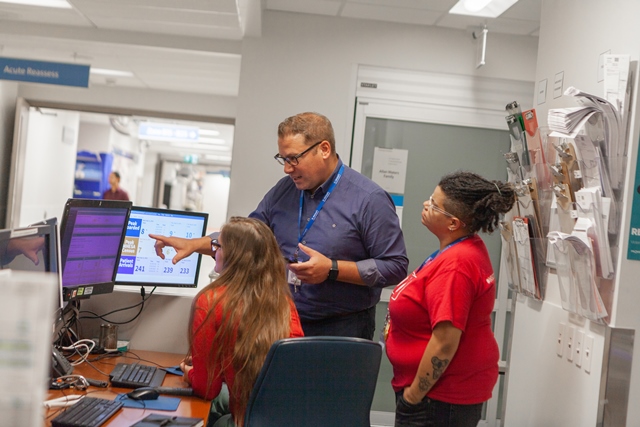By Jennifer Stranges
It was less than a year ago that Ray Howald, the clinical leader manager of the Emergency Department (ED) at St. Michael’s Hospital in Toronto, thought out loud, “Would it be possible to create a system that does this for us?”
The “this” was the daily assignment of nurses in the ED and mitigating the frustration that came with it. It’s a frustration shared by health care teams in EDs across the country – team leaders were spending an hour and a half each day assigning nurses and administrators spent four hours manually recording the information. Meanwhile, the duplication rate of assignments was high, at about 20 per cent.
Aside from being time-consuming, Howald had concerns that his staff were not receiving a variety of assignments in their shifts. His goal was to ensure that nurses had exposure to working in different zones, with different colleagues, and that there was objectivity in their assignments.
And so Howald’s simple question led to a journey of collaboration and an AI-powered solution that addresses scheduling and assignment challenges. Howald, along with two ED nurses who championed the project, worked closely with Dr. Muhammad Mamdani, director of the Li Ka Shing Centre for Healthcare Analytics Research & Training (LKS-CHART), and his team to develop a system that automates the assignments for nurses.
“We needed the system to take into account multiple considerations,” said Howald.
“It had to remember previous assignments so that nurses weren’t duplicating the zones they worked in; we needed a mix of experience and skillset so that each zone has the appropriate pairing of senior and junior nurses; and we needed the flexibility to make manual entries in the event there was a change in the schedule like someone calling in sick.”
Over the course of eight months and multiple iterations, Dr. Mamdani and the LKS-CHART team worked with Howald and ED nursing staff to develop and design a system that met their requirements and was user-friendly.
The system was tested by “super-users” in the ED, so it could be evaluated and tweaked. It was initially designed to remember the previous three days of assignments, which created a blind spot in the scheduling of part-time staff who worked less frequently. The LKS-CHART team adjusted the algorithm to remember the past 10 days of shifts, creating more accuracy in the assignments and fewer duplications.
The end product is one that Dr. Mamdani says has radically changed the RN ED assignments.
“What previously consumed four hours of admin staffs’ day, now takes 15 minutes,” he said. “The assigning that took team leaders an hour and a half is now generated by the system in 15 to 20 seconds. And the duplication rate has decreased from 20 per cent to about five per cent.
“This has been an exciting optimization problem, and it’s exciting from an engineering perspective. The magic of it all is that it’s helping people do their jobs more efficiently and effectively,” said Dr. Mamdani.
He notes that a meaningful benefit of the system – affectionately dubbed “The Robot” by ED staff – is that it’s created opportunities for better patient care.
Dr. Mamdani and his team have adapted the concept to be used for assigning resident physicians to their shifts at St. Michael’s.
“Historically, residents were assigned very structurally. It was very rigid, and the assignments weren’t reactive to volumes,” he said.
Dr. Mamdani worked with Dr. Ophyr Mourad, a general internist at St. Michael’s, to review patterns that should be considered in scheduling residents – including flow of patients on weekdays versus weekends, patterns in emergency codes within the hospital, and the intensity levels of cases.
The collection of these patterns served as data points for the resident assignment tool, and the LKS-CHART team created a data-driven solution that has fundamentally changed the way residents are assigned to shifts.
“There were times where residents were underutilized because they were over-staffed, and there were times where residents would feel pressure because there wasn’t enough support and there were too many patients,” said Dr. Mamdani.
AI-powered tools such as the RN and residents assignment systems are optimizing hospital resources – a challenge that hospitals aim to address globally. For Dr. Mamdani, creating cost efficiencies and better experiences for hospital staff and patients through AI is largely about monitoring patterns.
“A lot of the solutions are about learning what happens when.”
Jennifer Stranges is a communications advisor at Unity Health Toronto




